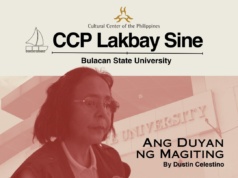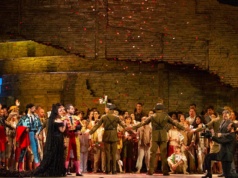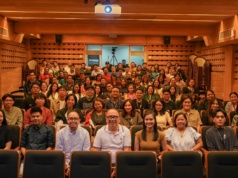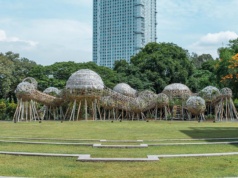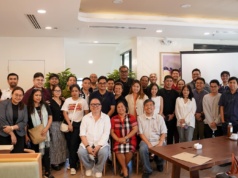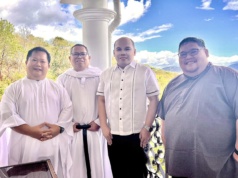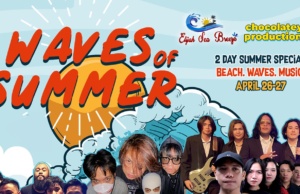By Susan Claire Agbayani
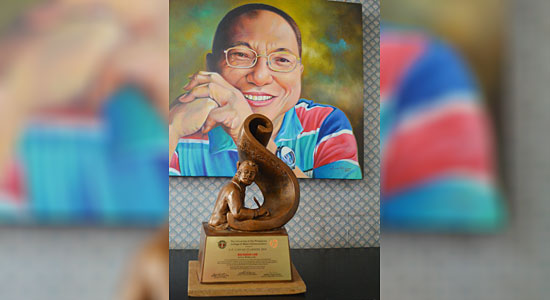
Mr. Lee, also known to friends, colleagues, and admirers as Ricky Lee, was honored for having created “a body of cinematic masterpieces like Himala, Salome, Brutal, Moral …and many significant films done with other scriptwriters… all of which gave a faithful and insightful interpretation of the realities of Filipino society, amid and in spite of the escapism and commercialism of the film industry,” said the citation signed by UP President Alfredo Pascual, UP Chancellor Michael Tan, and UP CMC Dean Roland Tolentino.
Mr. Lee was also cited “For bravely depicting in his films themes considered taboo or radical in Philippine cinema — such as the oppression of women in Brutal, Moral, and Karnal, the abuses of authoritarian leaders in Gumapang Ka Sa Lusak, the exploitation of sex workers in Private Show, the evils of religious superstition in Himala, the plight of HIV victims in Dahil Mahal Kita (The Dolzura Cortez Story) — all of which he wrote from the point of view of the victims themselves.”
Not a few of these films are among the highlights of Philippine cinema’s Second Golden Age, beginning in the 1970s onwards, after the breakthrough decade of the 1950s. Brutal, Moral, and Karnal, as well as Alyas Baby Tsina are among the acclaimed masterpieces by the late filmmaker Marilou Diaz-Abaya in partnership with Mr. Lee and other film artists. These films were also unique in their creativity.
Mr. Lee said he tackled the taboo topics of homosexuality and marital rape in Moral — which had “no plot,” “no inciting incident,” and actually “had no story.” Brutal also employed a lot of flashbacks within a flashback and was very “non-linear.” Salome actress Gina Alajar noted that the film “didn’t have a script.” Yet there was a time when films like Brutal merited the publication of their scripts which were sold in bookshops like Solidaridad. Sadly, these published scripts are now out of print.
Through his works, Mr. Lee also established “the importance of the screenplay as the backbone of the film and the screenwriter as indispensable to the creative process of filmmaking…establishing screenwriting both as a prestigious profession and as a form of literature at par with poetry, fiction and drama,” his citation stated.
‘IGNORED STORIES’
In his message, Mr. Tolentino said that with the voice created by Mr. Lee, the Filipino scriptwriter may now be considered an auteur — a word previously reserved or accorded only to film directors.
“The UP Gawad Plaridel is the sole award in the UP System that’s given to outstanding media practitioners. It bestows honor on Filipino media practitioners who have excelled in media (print, film, radio, television and new media) and have performed with the highest level of professional integrity in the interest of public service,” according to the souvenir program for this occasion.
Previous awardees of Gawad Plaridel include Cheche Lazaro and Florence Danon-Gayda (Rosa Rosal) for Television; Fidela Magpayo (Tiya Dely) and Eloisa Canlas (Lola Sela) for Radio; Eugenia Duran Apostol and Jose Maria “Pete” Flores Lacaba for Print; Pachico A. Seares for Community Print; Rosa Vilma Santos and Nora Villamayor (Nora Aunor) for Film; and Kidlat Tahimik for Independent Film.
The award is, of course, named after the evocative pen name of ilustrado propagandist Marcelo H. Del Pilar. Like Plaridel, the recipient of the award “must believe in the vision of a Philippine society that is egalitarian, participative, and progressive, and a media that is socially responsible, critical and vigilant, liberative and transformative, and free and independent.”
In her written message, OIC Dean Evelyn Katigbak remarked, “Lee is among the very few who courageously details the often ignored stories of the marginalized and oppressed.”
In his welcome remarks, Mr. Tan mentioned that apart from over 150 scripts that Mr. Lee had written, this “trans-generational, trans-media practitioner” was an activist during the Martial Law years; “wrote some of the most incisive articles on subjects such as poverty, prostitution and child trafficking” for the Philippines Free Press and Midweek in the 1970s and 1980s; had set up in the 1990s — when there were no DVDs and no YouTube — a shop called “Shop and Lift” where one could mine rare films, posters, and records; conducted scriptwriting workshops from his home, and penned the scriptwriting manual Trip to Quiapo — thus educating a whole generation of students. (Dr. Nicanor Tiongson said “two generations.”)
“Deep down, he’s an ethnographer, an anthropologist,” concluded Mr. Tan.
MISADVENTURES
During his Plaridel lecture, Mr. Lee recounted his cherished youth at UP Diliman, where he wrote his early stories such as “Servando Magdamag.” At Narra Residence Hall where he stayed, he was known as “the Bicolano Chinese who majored in English but wrote in Pilipino.”
He shared that whenever he’s about to launch a book, he always passes by UP Chapel. “UP grounds me, criticizes me, betters me,” he said.
He also recounted his adventures and mishaps in his adoptive city (after fleeing his hometown of Daet in Camarines Norte): of walking right smack at a glass door at the office of the pre-martial law weekly Asia Philippines Leader; entering and sitting at the backseat of a car between a Chinese couple whom he didn’t know from Adam and Eve; waiting for the number of cars to dwindle at the SM North parking lot so he’d figure out where he had parked his car; and hailing and boarding a cab, only to realize two blocks close to home that he had a car parked — with a driver to boot — waiting for him at the mall parking lot!
Mr. Lee said it was important to open doors even if one didn’t know what awaited you, whether it was a ravine, darkness, or a monster.
He recalled the flak he got when he started conducting scriptwriting workshops in 1982, after writing for only four years. Because he believed then, as now, that “The writer is never an island. The act of creating necessitates the act of sharing.”
About a decade ago, members of the Writers Studio (the group of his former workshop fellows and students) estimated that Mr. Lee had trained around 70% of the current crop of scriptwriters for film and television, including Jeffrey Jeturian, Armando Lao, and Lav Diaz. The actual figure could even be more.
He lamented the classic challenges that scriptwriters have to face: “bad reviews, not given credit, unpaid; and worse, scripts that never see the light of day.”
“They are like aborted babies,” he said of these dormant scripts.
After the awarding ceremonies at Cine Adarna of the UP Film Institute, a reception in Mr. Lee’s honor was held at the Executive House, attended by Ms. Chanda Romero and Mr. Lee’s close friend and Karnal actress Cecille Castillo.
This was followed by a tribute by Mr. Lee’s former workshop fellows (both alumni of his free workshops and grantees of the ABS-CBN workshops) and members of the Writers’ Studio at the UP Film Center. Among the singers who performed during the occasion were Isabella de Leon, the daughter of a former workshopper; and Darryl Shy, the husband of Ann Angala-Shy, one of Ricky’s students at the UP CMC in the late 1980s. Those who offered tributes were Cris Violago, Homer Novicio, Fudge Bajar, Ms. Shy, and National Artist for Literature Bienvenido Lumbera.
“I want to hug all of you. I have no regrets. I am very happy now,” Mr. Lee said in response to the touching and warm tributes. He announced that the musical Kabesang Tales, whose libretto he wrote, will be staged soon.
This month, Mr. Lee will be conferred another prestigious award, the Gawad CCP Para sa Sining, in the field of Literature. But the work continues — he mentioned his plan with Ms. Shy to revitalize the Writers’ Studio, as an institution that would safeguard the welfare of the scriptwriter. And so does the collective tribute to this protean talent. Everyone agrees a National Artist Award should be in the horizon.
Source: Business World


